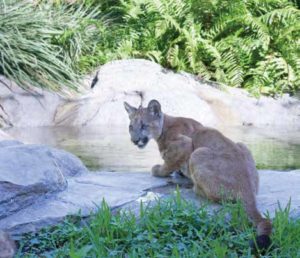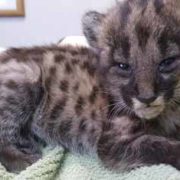Athena the Panther kitten left behind

by Kelsey Burr
Naples Zoo Marketing Associate
At just a few weeks old, Athena the Florida panther kitten, was left behind. Her mother, who was being monitored by National Park Service biologists in Big Cypress National Preserve, had left her den for good and taken her three other kittens with her. Athena was the runt of the litter and also had numerous health issues. Biologists say that sometimes mothers abandon a kitten if they have too many in their litter.
When biologists found Athena back in June 2017, she was tiny and weak, but she wasn’t ready to give up. That’s how she got her name – for being fierce and brave like the Greek goddess Athena. National Park Service biologists tried to reintroduce Athena to her mother, but weren’t successful. That’s when the decision was made to remove her from the wild. Athena was taken to Animal Specialty Hospital of Florida, where veterinarians addressed her numerous health issues, including pneumonia.
 She was moved to Naples Zoo in August 2017, where she was cared for behind-the-scenes by our veterinarian and carnivore team. In November 2017, Athena was finally old enough and healthy enough to be introduced to guests in the panther exhibit. The now 8-month-old loves her new space – you can often catch her sprinting around and jumping out of bushes, or coming up to the glass to look at children. Research has shown panther kittens need about six months of living with their mother in order to be successfully reintroduced into the wild. Because Athena was so young when she was abandoned, she will now permanently live here at Naples Zoo.
She was moved to Naples Zoo in August 2017, where she was cared for behind-the-scenes by our veterinarian and carnivore team. In November 2017, Athena was finally old enough and healthy enough to be introduced to guests in the panther exhibit. The now 8-month-old loves her new space – you can often catch her sprinting around and jumping out of bushes, or coming up to the glass to look at children. Research has shown panther kittens need about six months of living with their mother in order to be successfully reintroduced into the wild. Because Athena was so young when she was abandoned, she will now permanently live here at Naples Zoo.
The hope is to one day introduce her to Uno, the adult male panther who was also rescued back in 2012. Before that day comes however, Athena has to be much larger, and we need to make sure both cats will get along. Uno and Athena would be paired for companionship, not to make more kittens. Right now, the two are taking turns on exhibit with Athena out for guests in the mornings from 9 a.m. to noon, and Uno out in the afternoons.
With a growing panther population in the wild, the state needs accredited zoos to have exhibits ready to take in orphaned or injured cats. In fact, Athena is the third kitten to receive care at Naples Zoo’s panther facility since it opened in 2015 as part of a collaborative effort with the US Fish and Wildlife Service (USFWS) and Florida Fish and Wildlife Conservation Commission (FWC).
The conservation efforts for Florida panthers have been a success, but there’s still work to do. Florida panthers teetered on the edge of extinction back in the 1970s, when there were as few as 20 to 30 cats left. Now, the
population is estimated between 120 to 230 cats. To do your part to help endangered Florida panthers, consider purchasing a Florida panther license plate. Fees from the purchased plates go toward FWC’s panther monitoring, research, and management efforts. You can also help by committing to drive the posted speeds in designated panther zones. Dozens of Florida panthers die on the roads each year.
You can make your commitment at www.panthercrossing.org and get a panther crossing decal for your vehicle.
If you’re interested in learning more about Uno’s story, visit www.napleszoo.org/panther.
Far from the simple menageries of the past, today’s nationally accredited zoos are centers of learning and natural crossroads for biologists, educators, environmental scientists, and researchers – as well as for students, conservationists, and all animal lovers. Naples Zoo at Caribbean Gardens is a trusted, private 501(c)
(3) nonprofit serving wildlife and families here and around the
world. More information at www.napleszoo.org.




What a wonderful and happy ending. Great story!